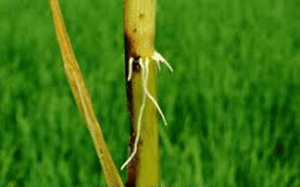TAG: GS 3: AGRICULTURE
THE CONTEXT: The Punjab Agricultural University (PAU), Ludhiana, has developed biocontrol agent Trichoderma asperellum (2% WP), and registered it with the Central Insecticides Board and Registration Committee (CIBRC).
EXPLANATION:
- Biocontrol agents have gained prominence in agricultural practices due to their eco-friendly nature and effectiveness in managing crop diseases.
- The recent development of a biocontrol agent by Punjab Agricultural University (PAU) to combat foot rot disease in Basmati rice crops marks a significant milestone in sustainable agriculture.
Foot Rot Disease in Basmati Rice
- Foot rot, caused by the fungus Fusarium verticillioides, poses a significant threat to Basmati rice cultivation.
- It is also known as Bakanae Disease.
- It is a soil and seed-borne deadly fungus which is seen only in the Basmati variety of paddy.
- The infected saplings turn pale yellow and become elongated and later, the saplings start drying and usually die.
- Symptoms sometimes appear after transplantation and the infected plants first grow way taller than the normal plants and die after a few days.
- The infection spreads through soil and seed, making it crucial to implement preventive measures during the seedling stage and transplantation.

Current Management Practices and Challenges
- Farmers currently rely on chemical treatments and cultural practices to control foot rot.
- However, these methods have drawbacks such as soil toxicity and consumer health concerns due to chemical residues.
- Timely seedling treatment and proper nursery management are recommended to minimize the disease’s impact.
- Nonetheless, foot rot remains a persistent challenge, jeopardizing crop yields and export potential.
PAU’s Innovative Solution: Trichoderma asperellum
- PAU’s biocontrol agent, Trichoderma asperellum, offers a promising alternative to chemical pesticides.
- It was developed by Dr. Narinder Singh and Dr. Daljeet Singh Buttar.
- This eco-friendly agent effectively combats foot rot without leaving harmful residues on crops.
- Its non-chemical approach aligns with sustainable agricultural practices, promoting environmental safety and consumer health.
- During experimental trials, Trichoderma asperellum demonstrated excellent efficacy in controlling foot rot.
- The agent’s application on both seeds and seedlings yielded positive outcomes, underscoring its potential for widespread adoption.
- However, ensuring the distribution and adoption of this biocontrol agent among farmers poses logistical challenges.
- PAU’s collaboration with a private company for large-scale manufacturing and distribution signifies a crucial step towards making Trichoderma asperellum accessible to farmers.
Implications for Basmati Rice Cultivation and Export
- The successful implementation of Trichoderma asperellum holds significant implications for Basmati rice cultivation and export in Punjab.
- By mitigating foot rot disease, farmers can safeguard crop yields and enhance export prospects.
- Moreover, the adoption of eco-friendly solutions aligns with global sustainability trends, positioning Basmati rice as a premium, environmentally responsible agricultural product.




